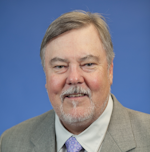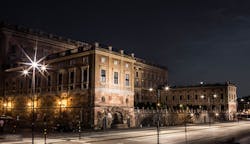Stockholm to require TALQ support in a smart outdoor SSL pilot
The TALQ Consortium has announced that the city of Stockholm, Sweden has joined the TALQ Consortium and will require TALQ compliance in a planned outdoor solid-state lighting (SSL) project, ensuring the city is not locked into a single vendor for smart city technology. TALQ compliance ensures that central management software (CMS) platforms from different vendors will work with network gateway devices from different vendors, certifying interoperability in LED-street-light centric connected installations that will enable smart city applications.
“The City of Stockholm has been looking into a new control system for some years, but due to the lack of appropriate standards, the work has been slow,” said Björn Lindelöf, lighting engineer with the City of Stockholm Transport Department. “Now we can see the market maturing and standards grow stronger, one of which is TALQ. Therefore, we chose to have TALQ support as one of our requirements in procuring a central management software for a lighting pilot, and also join the consortium to get access to all relevant documentation and information, as well as following the development more closely.”
We have followed the development of TALQ going back nearly a decade and the process of standardization has been slow, as standards development often is. Still, standards are key to multivendor interoperability. We recently ran a feature article that discussed all of the different standards including TALQ that might come into play in an outdoor SSL network. Such standards could pave the way for broader deployment of smart city applications.
Moreover, TALQ has begun to gain momentum, although roadblocks remain. As we reported recently, the organization has been concerned over companies claiming TALQ compliance without going through the certification process. Still, TALQ has an impressive roster of vendors from around the globe that have joined and certified either CMS platforms and/or network gateways or what the standards body calls Outdoor Device Network (ODN) systems.
The larger problem for TALQ, however, could be the fact that the largest SSL companies are still offering their own proprietary, turnkey smart-city platforms. Some of these larger vendors simply see no reason to support a standard that could result in their products and technologies being mixed and matched with those from other vendors.
Perhaps, however, it’s the municipalities that will ultimately wield the power in smart outdoor lighting and the smart city future. If enough cites such as Stockholm require TALQ compatibility, all vendors will ultimately have to make a step toward compliance.
“As a city with a large installation, we see that it’s crucial for the long-term maintenance to build a system that is modular and flexible,” said Stockholm’s Lindelöf. “For us, that means no vendor lock-ins and that the building blocks are independent from each other. As a minimum, the CMS and the lighting network should be independent from each other. Being a partner in TALQ, we hope to learn more about building these systems and also influence the development.”

Maury Wright | Editor in Chief
Maury Wright is an electronics engineer turned technology journalist, who has focused specifically on the LED & Lighting industry for the past decade. Wright first wrote for LEDs Magazine as a contractor in 2010, and took over as Editor-in-Chief in 2012. He has broad experience in technology areas ranging from microprocessors to digital media to wireless networks that he gained over 30 years in the trade press. Wright has experience running global editorial operations, such as during his tenure as worldwide editorial director of EDN Magazine, and has been instrumental in launching publication websites going back to the earliest days of the Internet. Wright has won numerous industry awards, including multiple ASBPE national awards for B2B journalism excellence, and has received finalist recognition for LEDs Magazine in the FOLIO Eddie Awards. He received a BS in electrical engineering from Auburn University.





